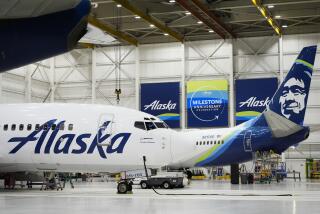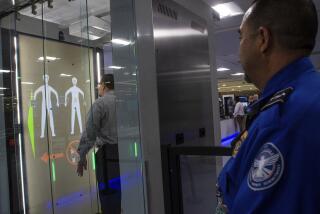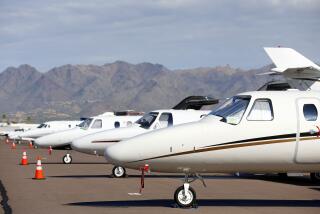Pilots Asked to Be Vigilant
- Share via
WASHINGTON — More than half a million private pilots will be asked to report suspicions of terrorist activity to a national hotline under a program being announced today in a move to ward off possible security restrictions on private aviation.
The Airport Watch program is a joint effort of the Transportation Security Administration and the Aircraft Owners and Pilots Assn., organizations that have eyed each other warily since the Sept. 11 terrorist attacks.
To the TSA, “general aviation” has seemed like the ultimate vulnerability, with thousands of lightly patrolled airfields at which pilots come and go as they please. Private pilots, meanwhile, feared an assault by the government on their cherished freedom to fly.
Private pilots, while ready to be on the lookout, are continuing to battle the TSA over measures they consider too draconian, such as a new rule that entitles the government to summarily revoke the licenses of pilots it deems to be security risks.
The vigilance program is modeled on Neighborhood Watch, an anticrime initiative that became popular in the 1980s. The government is providing a toll free number, (866) 427-3287, for pilots and others at small airports to report possible security threats.
“Airports are small communities,” said Warren Morningstar, a spokesman for the Aircraft Owners and Pilots Assn., which represents 393,000 of the licensed pilots. “The people who are [at] the airport know who is supposed to be there, what kind of activity is normal, and what looks strange. In many ways, they are the best kind of security.” California has the largest private aviation community in the country, he added.
Civil liberties groups expressed concern that Airport Watch will lead to discrimination.
Last month near Boston, two Brazilian men inquired about buying a small plane and were promptly turned over to federal authorities, who detained them on immigration charges. Original reports said the two were from the Middle East and had asked about buying a crop duster that could be used to spray toxic substances. It turned out they were apparently shopping for a plane that could be shipped to a relative in Brazil.
“There is always the potential for abuse,” said Kareem Shora, a lawyer with the American-Arab Anti-Discrimination Committee. “What are the safeguards against abuse? There are a lot of evil, ignorant people around the world who might report somebody simply because they had an argument with him the other day.”
Officials with the pilots’ group say their goal is to raise awareness, not to spread paranoia. The group has produced a brochure and a training videotape that is being distributed to volunteers at 1,400 airports.
“The Sept. 11 terrorists were from the Middle East, but the next terrorists could be from anywhere, and look like your next-door neighbor,” association president Phil Boyer says on the video. “There is no terrorist type. Terrorists don’t always speak with an accent or look a certain way.”
Fears about small planes increased last year after a teenage student pilot took off without permission and deliberately flew into the side of a Tampa, Fla., office building. Though the 15-year-old left a note expressing sympathy for Al Qaeda leader Osama bin Laden, investigators concluded that he was motivated by personal problems.
The pilots association brochure encourages small-plane owners to keep their aircraft locked, carry identification and provide airport operators with photos of other pilots who have permission to use their planes. It urges private pilots to carry cameras to take photos of anything that might seem suspicious, and pen and paper to write details.
More to Read
Sign up for Essential California
The most important California stories and recommendations in your inbox every morning.
You may occasionally receive promotional content from the Los Angeles Times.













